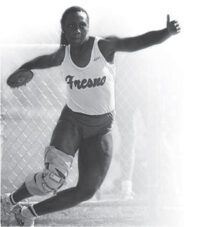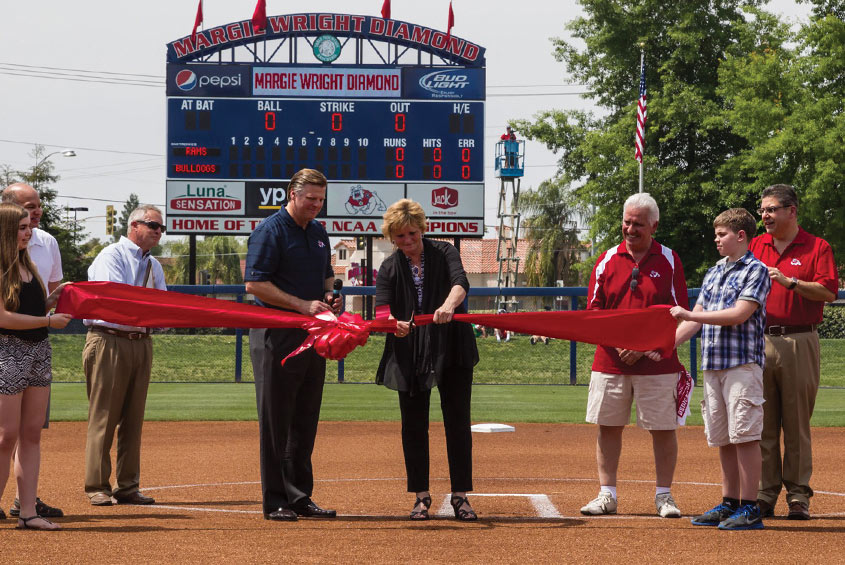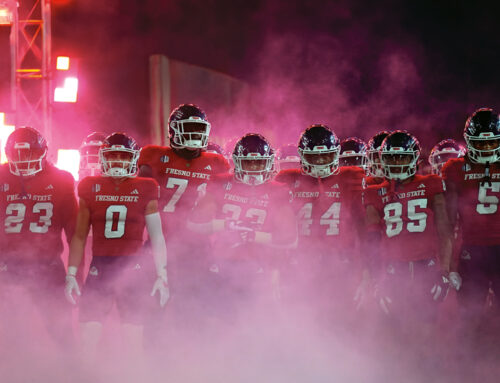Title IX Turns 50
Community scholarship support can fuel lifelong success of student-athletes
By Maggie Thach Morshed

When Lacy Barnes-Mileham arrived on the Fresno State campus as a freshman in 1983, she was not alone — she had her toddler daughter in tow. Determined to break out of the societal expectation of teen mothers, Barnes-Mileham wanted to make the most of her opportunity to compete, but she needed support.
“If you were to talk to my daughter, she would say that the whole team were her parents,” Barnes-Mileham says. “If the babysitter fell through, [my teammates and coaches] would watch her at the track. The small-town feel of Fresno State was the village that I think people refer to when a community is supporting you.”

For Barnes-Mileham, the opportunity to attend Fresno State as a scholarship student-athlete in the era of Title IX was not just for her, but for her daughter, too. And she made the most of it.
Title IX is a federal law passed in 1972 that guarantees equal access to any program or activity that receives federal funding.
Barnes-Mileham earned her bachelor’s and master’s degrees from Fresno State before getting her Ph.D. and a law degree. She now serves as senior vice president for CFT, a union of educators and classified professionals.
In competition, she was a three-time national runner-up (1985, ’86, ’87) in discus, before competing for Team USA in the 1996 Summer Olympics in Atlanta. Her time as a collegiate athlete coincided with a time of great success for women’s athletics at Fresno State — and an era that set the foundation for many of the opportunities that exist today for women and girls in athletics.
Scholarship support fuels student-athlete success
The Bulldog Foundation is tasked each year with raising the funds necessary to provide scholarship assistance to about 400 Fresno State student-athletes. The estimated total cost of student-athlete scholarships in 2021 was $8 million. Fresno State’s student-athletes set a record-high in 2020-21 with a 3.37 cumulative grade-point average.
“When a person has an athletic scholarship,” says Fresno State Director of Athletics Terry Tumey, “what you’re saying as a
University is, ‘I feel so good about you that I am going to enhance your life through education. I’m going to provide you the opportunity to improve yourself and have more tools, more resources, more assets, in order for you to grow personally.’ That’s a huge gift. We don’t celebrate that gift enough.”
That gift would not be possible without the private support of the community. And while scholarship support is critical to the success of both male and female student-athletes on campus, the Bulldog Foundation is embarking on a special campaign to support the long-term success of women’s athletics in honor of this year’s 50th anniversary of Title IX.
Celebrating 50 years of Title IX

What Title IX means for collegiate sports is that public institutions are legally required to provide men and women with equitable sports opportunities. What that means for Fresno State women’s athletics specifically is a storied history of all-Americans, an impressive number of Olympians and many conference and NCAA championships — including the softball team’s 1998 national title.
Former Fresno State softball coach Margie Wright knows what it takes to make the most of opportunities. When Wright was a three-sport collegiate athlete at Illinois State in the early 1970s, before the introduction of Title IX, being treated the same as a male athlete was a far-off fantasy, she says. There were no pre-game meals, buses or planes for travel to away games and tournaments, or stadiums dedicated solely to her sports.
Even when she first became the softball coach at Fresno State in 1985, she says she had to beg to have lights installed at the field her team played at so that they could hold evening games. Eleven years later, in 1996, Bulldog Diamond opened as the largest on-campus softball stadium in the country (dedicated as Margie Wright Diamond in 2014).
It wasn’t an easy or smooth road, but she took every opportunity that Title IX afforded and pushed to provide more for her student-athletes.
“The fact that the law got passed so that female athletes could receive scholarships for their God-given talents is phenomenal,” Wright says. “[Title IX] changed athletic departments across the country. All the years of hard work that female athletes put into their sports, now, was being validated with scholarships, fans, facilities, marketing and recognition. That never happened to them before.”
Wright, who is now retired after a storied 27-year career at Fresno State, notes how today’s young female athletes might not realize that women’s sports hasn’t always been like it is now — it took a lot of advocating, fighting and empowerment to make the progress that it did. It’s women like Wright who have paved the way, and even though she missed out on what Title IX would have given her access to as an athlete, she said she wouldn’t have had it any other way.
“I’m so grateful that I got to be one of those pioneers,” Wright says.
There’s no doubt future generations will be grateful, too.
— Maggie Thach Morshed is a freelance writer based in San Diego.




